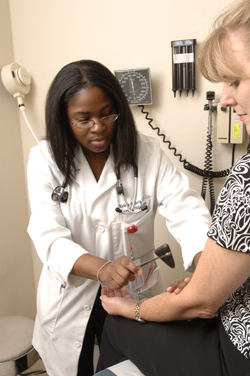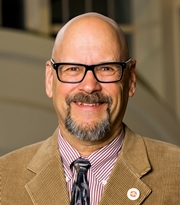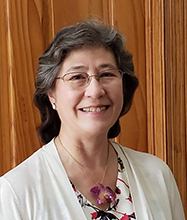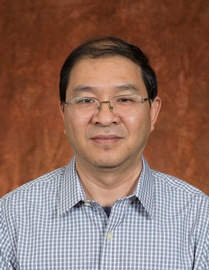CONTACT: Doug Carlson (850) 694-3735 or
Randall Bertolette, M.D., (772) 462-7041
By Doug Carlson
June 20, 2007
FORT PIERCE, Fla. − Starting July 2, Fort Pierce residents visiting the same physicians they’ve gone to for years might be greeted in the waiting room for the first time by a sign indicating that their doctor is now a teacher.
Next week is the official beginning of the Florida State University Regional Medical School Campus – Fort Pierce, which is in the process of selecting more than 150 Treasure Coast area physicians to teach eight clinical specialties: family medicine, internal medicine, pediatrics, geriatrics, obstetrics/gynecology, psychiatry, surgery and emergency medicine, as well as a variety of fourth-year electives.
“The FSU College of Medicine students will be acquiring knowledge amongst a committed, enthusiastic, and motivated group of doctors in Indian River and St. Lucie Counties who are taking time out of their busy practices to participate,’’ said Dr. Jeff Livingston, president of the Indian River County Medical Society.
“I think the medical students will benefit from the real-world experience of seeing how medicine is practiced in the community setting. I have no doubt local physicians and patients will also benefit by participating in the process.’’
The initial group of eight third-year students, who will be training in the Fort Pierce area for the next two years, are the first wave in what will grow to a group of 20 new medical students a year.
At full capacity, the medical school’s Fort Pierce campus will be home to 20 third-year students and 20 fourth-year students, for a total of 40 students. Students complete the first two years of their education on the FSU campus in Tallahassee.
Perhaps the greatest impact of the program will be in helping Fort Pierce area hospitals, medical practices, health departments and other health-care facilities recruit future doctors. In the Treasure Coast area, FSU is affiliated with Indian River Medical Center, Lawnwood Regional Medical Center, Martin Memorial Health Systems and St. Lucie Medical Center.
“It’s going to be a win-win situation. I think our students will benefit by the expertise in the community and the doctors who teach them will learn and benefit from the students during the process,’’ said Dr. Randall Bertolette, regional campus dean for the Fort Pierce campus.
“There has never been a medical school presence in this area and there’s an underlying excitement on that basis because a lot of these physicians do want to teach and this will give them a chance they thought they wouldn’t get,’’ Bertolette said.
The medical school also is launching a new regional campus this week in Daytona Beach for third- and fourth-year clinical education.
The FSU College of Medicine was established in 2000 with a mission of educating physicians to care for Florida’s rural, geriatric, minority, and other medically underserved populations. With three graduating classes to date, the college has produced 111 doctors who currently are completing three to five years of required residency training.


 Over a three-year period, 19 percent of FSU College of Medicine graduates have entered family medicine residencies, trailing only the University of Kansas School of Medicine (22 percent). No other medical school in Florida rated in the top 50. The AAFP tracks the success of U.S. allopathic and osteopathic medical schools in producing doctors who select family medicine residencies, and the journal Family Medicine publishes the results annually.
Over a three-year period, 19 percent of FSU College of Medicine graduates have entered family medicine residencies, trailing only the University of Kansas School of Medicine (22 percent). No other medical school in Florida rated in the top 50. The AAFP tracks the success of U.S. allopathic and osteopathic medical schools in producing doctors who select family medicine residencies, and the journal Family Medicine publishes the results annually.

 Wang's research involves the role of an enzyme known as Cdc14 in deactivating the cell division process set in motion by another enzyme, Cdk1.
Wang's research involves the role of an enzyme known as Cdc14 in deactivating the cell division process set in motion by another enzyme, Cdk1.